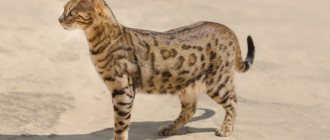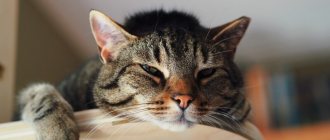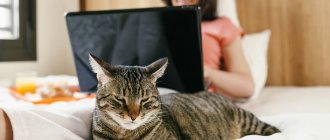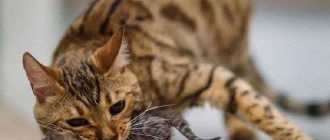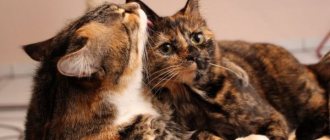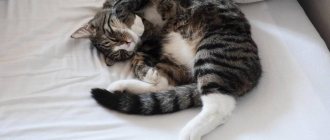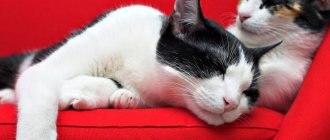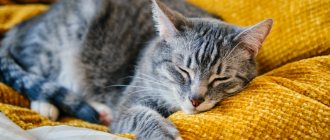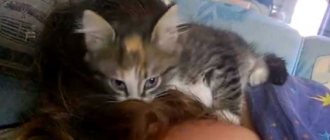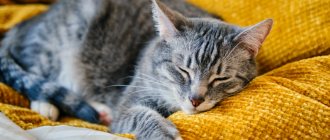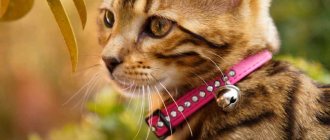Yawning is a common phenomenon characteristic of most living creatures, including cats. Frequent manifestations of this reflex cause concern among animal owners who are concerned about their health. So why do cats yawn? Should I be concerned if this happens frequently?
The breathing process in which a slow deep inhalation occurs and a sharp exhalation occurs is yawning. With inhalation, the blood is enriched with oxygen, and brain cells with nutrients that enter the bloodstream; with exhalation, carbon dioxide and unnecessary substances are cleansed. In addition to the important processes that occur in the body with yawning, the animal feels better, it has a feeling of lightness, consciousness clears up, and even the stress state decreases.
There is a version according to which a cat yawns to demonstrate its superiority, a leadership position characteristic of representatives of the cat world in their natural habitat. The animal shows a wide open mouth with impressive and sharp teeth.
When a cat yawns: what are the reasons for this phenomenon?
1) After sleep. When a cat sleeps, brain activity slows down. Blood flow slows down, brain activity slows down, and carbon dioxide accumulates in the blood. Accordingly, upon waking up, it is necessary to establish brain activity, so nature provided for yawning - a quick enrichment of the bloodstream with oxygen.
2) During times of stress. Stress leads to the release of harmful substances into the blood, which leads to a decrease in brain activity. Accordingly, to remove these substances, it is necessary to yawn tightly and, so to speak, relieve tension. You can observe a picture when a pet yawns due to stress, for example, in a veterinary clinic, when the four-legged dog is waiting in line with the owner to see a specialist.
3) After eating. To break down foods, part of the energy in the bloodstream is sent not to the brain, but to the digestive system, in order to ensure the breakdown of recently eaten food. The number of yawns at this moment increases in order to maintain brain activity at the desired level. It is worth noting that heavier cat foods that are poorly digestible cause more frequent yawning than easily digestible ones.
Natural and forced yawning - how to distinguish?
You need to understand that even if a cat yawns often, it does not control this process. Yawning is an involuntary action that is almost impossible to suppress. Such a strong reflex is due to the fact that a yawn provides oxygen to the brain - the most important, one might say, governing organ of the body.
Note! The reasons for yawning are always low blood oxygen saturation. Your task is to determine whether oxygen deficiency is a symptom of illness.
Read also: “Why did you decide to change jobs?”
Natural causes of yawning:
- After waking up - we discussed this case above, while the cat is sleeping, its organs are not working at full capacity, and a yawn makes it possible to mobilize the body. By the way, during a yawn and a sharp enrichment of the blood with oxygen, the same active displacement of carbon dioxide from the blood occurs. This process leads to increased brain activity and speed.
- In a stressful situation, adrenaline, other hormones and substances enter the cat’s blood, leading to increased activity of the brain and the whole body. Yawning compensates for oxygen costs and helps the blood quickly clear itself of decay products, substances “thrown” into the blood. Stressed yawning can be accurately detected when a cat is in an unusual environment - in a car or a veterinary clinic.
- Immediately after eating - for most of the day, the main volume of oxygen is distributed evenly throughout all organs, but after eating, the digestive system is activated. Food enters the stomach, is partially processed by acids and passes into the intestines. Through the mucous membranes of the intestines, beneficial substances are absorbed into the blood and distributed throughout the body. To increase blood flow and speed up the feeling of satiety, the cat instinctively yawns. In addition, yawning helps maintain a comfortable level of oxygen in the blood for the brain.
- After physical activity , all living beings can get tired; yawning helps maintain a normal level of vital activity. If a cat could not yawn, tired, it would immediately go to bed (as most apartment pets do), but when this is not possible, reflexive yawning maintains the functioning of the body.
How often does a cat yawn?
- The average cat yawns once every hour.
- Definitely after sleep and stretching.
- When this happens much more often, it is worth carefully examining the cat.
If your cat yawns at the sight of you, it is most likely showing happiness in your presence. The cat is relieved to feel at home and communicates that he feels safe with you. However, keep an eye on your cat's behavior. Any behavior that deviates from the norm should attract our attention. If your cat spends more time yawning than she should, have her checked by a veterinarian.
See also: Why do cats sleep a lot?
What happens when a cat yawns?
Yawning in a cat is an uncontrolled respiratory process of the body, consisting of a deep, slow inhalation and a quick, sharp exhalation. The result of the process is the enrichment of blood with oxygen and an increase in the rate of vascular blood exchange in the brain. And this leads to the enrichment of brain cells with nutrients coming from the bloodstream and cleansing them of carbon dioxide and harmful substances. Consciousness becomes clearer, well-being improves, some lightness appears in the body, and stress is relieved.
Psychological and physiological reasons
Yawning for cats is an uncontrollable process during which a deep breath is taken and a quick exhalation is made. Hyperventilation increases oxygen levels in the body and stimulates brain function. Normally, blood enrichment is necessary for a number of reasons:
- "Loading the body." Immediately after waking up, immediate activation of all processes in the body that were significantly slowed down during sleep is required. A deep yawn allows you to quickly raise the level of oxygen in your blood and get rid of excess carbon dioxide.
- Tactical move. A seemingly strange phenomenon can be observed during a hunt. Despite all their concentration, the cats suddenly begin to yawn. This occurs to sharply raise the level of oxygen in the blood before the subsequent burst.
- Ready for night adventures. In the evening, cats yawn not because of drowsiness, but to additionally conserve energy. Therefore, yawning is just preparation for night activities.
Also, by yawning, animals demonstrate their superiority and dominant role in the occupied territory. This is how most representatives of the cat family behave.
Acute eustachitis
An acute form of inflammation is a common complication of viruses and infections of the nasopharynx. With insufficient treatment, inflammation continues in the auditory tube. Children often experience pain in both ears; adolescents and adults suffer from unilateral manifestations. When asked how long it takes to treat eustachitis, doctors answer: adequate measures can get rid of it in 5-7 days. If:
- no treatment;
- therapy is insufficient or prescribed incorrectly;
- the course is not completed;
- there are pathologies in the nasopharynx or nasal cavities;
- there is constant allergic inflammation of the mucous membrane
there is a high probability of a prolonged course of tubo-otitis and its chronicity.
Diagnostics
Determining the exact reason why a symptom occurs is not easy, so it is important to pay attention to other signs.
With a complaint of frequent yawning, they contact a therapist, who conducts an examination and, if necessary, sends the patient for tests (biochemistry of blood and urine, ultrasound of organs, testing for tumor markers - depending on the situation). Based on the results obtained, the doctor will be able to make a more accurate diagnosis and refer you to a highly specialized specialist for further treatment.
If you suspect that frequent yawning is psychogenic in nature, you should consult a psychotherapist. Here the study will be based on a conversation with a doctor and performing psychological tests. Additional tests may be required to make a more accurate diagnosis.
Other pathological causes
Yawning is always a lack of oxygen in the animal’s body. The cat owner should be alert to the accompanying symptoms, since yawning may be a sign of more serious abnormalities:
- changes in atmospheric pressure - can provoke headaches in the animal, an increase or decrease in blood pressure, and a lack of interest in food;
- neurological diseases - disrupt the supply to the brain, so by yawning, the cat strives to improve its well-being.
For the normal condition of the animal, it is recommended, as in humans, to make scheduled visits to the veterinarian for a preventive examination and additional manipulations in the event of suspicious symptoms.
Yawning itself is an absolutely natural, physiological process of the body. The nature of yawning is explained very simply: oxygen starvation. When yawning, a large volume of air is inhaled, which means that the blood is more fully saturated with oxygen. But this is in humans. What about yawning in animals, in particular in cats?
In adults
Adult patients are characterized by left- or right-sided eustachitis affecting one side without fever, but with a complex of unpleasant symptoms. Patients suffer from:
- congestion in the ears, decreased hearing (low frequencies are almost not perceived);
- autophony (loud distorted perception of one’s own voice in the form of an echo);
- sensation of fluid in the ear;
- headaches or earaches.
Improvement occurs briefly when chewing or after swallowing saliva, food, or when tilting the head due to a short-term opening of the Eustachian tube and a change in fluid level.
Cats Yawn: Physiological and Psychological Basis
A yawn in a cat is an uncontrolled breathing process in which a slow, deep inhalation occurs and a rapid exhalation occurs. As a result, the blood is enriched with oxygen and brain function improves. Animal physiology and psychology will help you understand why cats yawn.
© shutterstock
Psychological yawning
A person yawning in a crowded place feels uncomfortable. Cats are the opposite: they yawn demonstratively to show their superiority and dominant position in a given territory. In films about wildlife, you can often see a lion lying in a clearing and yawning sweetly. By this he indicates to others their subordinate status.
In the process of yawning, a cat shows off its teeth and muscles.
Physiological yawning
The physiological basis of the yawning process is related to the need for oxygen to enter the body. So, a cat yawns:
- After waking up from sleep. When a cat sleeps, the whole body rests, processes slow down, including blood flow. Carbon dioxide accumulates. To saturate the brain and organs with oxygen, the cat yawns and stretches. As a result, the body's functioning returns to normal.
- In preparation for physical activity. Cats, like many predators, lie low, wait for prey, and then make a quick dash. The running speed of an animal directly depends on the work of the heart and the quality of oxygen saturation of the brain. Therefore, before making a jump, the animal yawns, feeding on oxygen, so that it can then quickly be used up.
- In the evenings. A cat's yawning in the evening does not mean that she wants to sleep. Cats are nocturnal predators. They sleep during the day and hunt at night. And the yawning of a cat is preparation for night life, for active actions.
Why does a cat lie on a person and purr? Why or why do cats purr?
We believe that cats make this velvety sound when they experience pleasant emotions... This is true, but only partly.
It turns out that an animal can purr for many reasons, and not only when it feels good. That's what we thought!
A way to calm down
In stressful situations, cats begin to purr.
This happens due to the fact that in childhood, when the mother was nearby, she would certainly purr songs to the kittens and thereby calm the tailed baby. In this way, small, adult and old cats try to calm themselves down in difficult life situations. Have you noticed that these sounds appear at the most inopportune moment? For example, during unloved combing or, in general, at that moment when the cat is angry and bites! It turns out he does this in order to pull himself together. The sounds produced have a calming effect on them.
Advice!
Next time you pet your pet, think about it! Or maybe at this moment he doesn’t like your stroking at all?
But our pets do not always purr when they are in a bad mood. When you come home and the cat greets you with a purr and a joyful “purr”, affectionately rubbing itself and walking with its tail, it means that it is glad to see you. Often, along with purring, cats like to hug and poke their noses in our faces. This is how they show us their love (by the way, sometimes animals can make half-meow, half-murmur sounds). Well, isn't it nice?
Sound therapy
It turns out that the sound of purring is pleasant not only for humans! By using their vibration, kittens are able to recover faster and also help us in this. The low timbre of this sound improves metabolic processes, promotes the healing of wounds and abrasions, and reduces pain. It’s not for nothing that they say that a cat lies down on a sore spot to heal it! So take your furbaby and get some relaxing sound therapy!
Charger
Cats get a lot of rest (which is why it is so important to provide a decent home for them). Of course, they also like to be awake, but they spend more time sleeping. It is believed that “purring” is a kind of exercise to keep their muscles and bones in good shape.
It is believed that “purring” is a kind of exercise to keep their muscles and bones in good shape.
Important! Vibration prevents muscles and joints from atrophying from prolonged inactivity
A way to demand something or an appeal
Also, by purring, cats are able to ask for something or even demand it! A cat may lie down next to you and start purring not at all from pleasure.
Thus, she attracts attention and asks the person for a little affection. Give your pet a little love and the volume of sounds emanating from it will increase significantly
Why does a cat trample and move its paws and purr loudly when you stroke them?
And sometimes they can climb on you and lie on your stomach. So why do they do this? When your furry pet climbs on you, this is the highest point of trust and one of the ways of greeting. But in theory, fingering with their paws should disappear over time, because this is the behavior of kittens in the first place - thus, they “milked” their mother in childhood. Most often, cats are taken away from their mother too early and they do not have time to grow up. Again, this behavior is a demonstration of joy and trust in you.
Boredom
Another explanation for a kitten yawning is that it is bored. Cats can get bored and anxious, just like their owners.
If you don't give your cat enough attention or play with him every day, boredom can quickly creep in. Almost all animals breathe deeply when they are stimulated in some way. If your pet doesn't get enough mental and physical stimulation, he may start yawning.
It's important to make sure your fuzzy friend gets the attention he deserves every day. You should take time to play with your cat, especially if it seems like she might be bored.
You may interpret this behavior as your cat trying to tell you that she needs to be entertained and that this is partly your responsibility.
Is yawning a sign of a health problem?
Most cat yawns are a natural part of the body's functioning or an attempt at communication. As with any behavior, if something happens too often and is not adaptive, it may indicate health problems. There are three possible explanations for an excessively yawning cat:
Dental problems. When a cat yawns frequently, it may feel a toothache. Additional symptoms include drooling, bad breath, red gums and feeding problems. Intervention by a feline dentist will be necessary. Shortness of breath. When your cat is breathing at an accelerated rate, panting, making strange sounds while breathing, do not delay your visit to the veterinarian. Hypercapnia. This is a condition in which there is too much carbon dioxide in the body. The still yawning cat is trying to remove the CO2 and replace it with oxygen. You may need urgent treatment.
Interruptions in the functioning of the heart are periodically disturbing
Such violations do not always indicate a serious problem. Very often, people who experience arrhythmia do not suffer from severe heart disease.
Causes of abnormal heart rhythm may include lack of sleep, taking certain medications, a reaction to stress or exercise, smoking, or drinking alcohol. However, there are conditions in which dangerous symptoms appear, sometimes even life-threatening.
When to see a doctor if you have heart problems
If heart rhythm disturbances occur frequently or are accompanied by chest pain, shortness of breath, dizziness, darkening of the eyes, it is necessary to conduct a full examination to clarify the cause of the arrhythmia.
.Arrhythmia
may be a symptom of heart failure, thyroid diseases, and various poisonings.
The main method for diagnosing heart rhythm disorders is an electrocardiogram (ECG), stress ECG and 24-hour ECG monitoring.
The child yawns often - why?
The baby begins to yawn while still in the mother's womb at about the eleventh or twelfth week of pregnancy. Why do children yawn? One recent American study confirmed that yawning is evidence of the successful and correct development of a baby's lungs. However, at each age, the tasks of yawning are different, and if a yawn often helps adults to cheer up, then a baby, with the help of a yawn, regulates the temperature of the brain, calms down and falls asleep.
But if a child yawns too often and not when it is time for him to rest, it would be a good idea to consult a doctor, since yawning may indicate a lack of oxygen or nervous tension. In the second case, you will need to consult a neurologist, and if the problem is a lack of oxygen, then you will have to reconsider the baby’s regimen in the direction of increasing the duration and frequency of walks in the fresh air.
Controlling brain overheating
According to American researchers, yawning plays a critical role in regulating brain temperature. Like a computer, our brain can “overheat and fail” after prolonged activity. By yawning, we open up access to cooler air and new blood flow. As a result, our brain “reboots” and functional activity is restored.
Surprisingly, yawning prompts decisive action. During tense situations, our body seems to freeze, and breathing spontaneously stops for a while. And this is where yawning comes to the rescue. Saturating brain cells with oxygen improves readiness for responsible decisions.
Everyday Reasons for Frequent Yawning
Cats, like humans and other animals, behave in a similar way and begin to yawn under certain conditions:
- Stuffiness in the room. Increased humidity, temperature and lack of oxygen cause yawning to provide additional air.
- Confusion of the animal. In this state, a good yawn helps you quickly make a decision for further action. Again, this is due to the increase in oxygen concentration in the animal's blood and brain.
- Boredom. Against the background of this state, drowsiness increases, and yawning becomes the expected result of a lack of entertainment.
- The period after eating. For complete digestion, the body redistributes blood, resulting in most of it accumulating in the digestive system. Blood circulation in the brain decreases. Yawning helps compensate for oxygen deficiency.
- Physical fatigue. Yawning in this case means going to bed soon. A long rest will compensate for the loss of strength in the future, and the pet will wake up cheerful and active.
As you can see, yawning is not something inexplicable. All physiological processes in the body have a clear sequence and mechanisms to compensate for the listed conditions.
Owner's actions. In order for the pet to feel good, the owner must follow the recommendations of specialists:
- First of all, you need to let your cat sleep as much as she wants. You cannot intentionally wake a cat, even if it keeps you awake at night. There are more humane ways to solve this problem.
- During the daytime, you should pay more attention to your pet and play active games with it. This will not only allow the animal to release all excess energy, but will also strengthen the bond with the owner.
Whatever the innate instincts and habits of the mustachioed tabby, exercise during the day will ensure healthy and sound sleep at night.
How to get rid of yawning, recommendations
To stop your pet from yawning you need to:
1) Allow the animal to get enough sleep, that is, organize a daily routine.
2) Provide physical activity, namely, play more. The latter is easily achievable if you use special toys for cats , which allow you to use all muscle groups in the body of the mustachioed tabby.
3 Balance your diet. Food should be easily digestible
4) Try to reduce the number of stressful situations. If such problems occur, use special herbal preparations to relieve tension, fear, stress, allowing the four-legged animal to relax.
5) Be regularly examined by a veterinary specialist; in case of illness, carry out treatment measures in a timely manner.
And the cat brethren even yawn very often. However, such behavior, contrary to popular belief, is not necessarily a sign of laziness! Why do cats just sit and yawn? In what situations does this happen and what could it mean? The fact is that there is not a single specific answer to this question. There is too much theory on this topic.
Information to get started; It’s not surprising, but not only all mammals, but also… birds and even fish just sit and yawn! It turns out that this reflex occurs in many animal species, which leads to the conclusion that yawning itself may not be a useless phenomenon - after all, nature knows what it is doing! See if any of the explanations below apply to your pet.
Yawning the cat wakes up to life.
Classic. It's hard to find a simpler explanation. Cats just sit and yawn after sleeping for several hours when they first wake up or try to wake up. What's interesting is that our pussies, unlike humans, don't just sit and yawn when they wake up. They, as a rule, squint their eyes, arch their whole body and stretch out their front legs, while their back legs, on the contrary, tuck in, as in the photo. At the same time, when yawning, they widely show their throat and teeth.
By yawning, a cat relieves stress.
This explanation applies in principle to both cats and dogs. In stressful situations (for example, when another animal appears in the field of view, or when the pet simply feels threatened from the outside), the easiest way to relieve anxiety is to yawn. There is another reason: the furry one simply doesn’t want to show fear. This is a signal to a potential enemy - I’m not afraid of you, but I don’t want to fight with you either.
The cat yawns when he feels stuffy.
Just like us! This is scientifically proven. A cat who yawns when he feels stuffy. A good yawn is the best way to bring air into the body. Who among us, after being in a stuffy room for too long, does not have the same reflex?
A cat yawns when it doesn't know what to do.
Again, this is typical for cats and dogs. When a pet doesn’t know what to do in a certain situation. Apparently a yawn, which causes a strong flow of air, stimulates the body, and it is easier for the animal to make a decision. Some argue that in such situations the little sneak gets precious seconds to think - what to do here? Probably, more than once you called your pet to your place, and instead of immediately going to you, he sat down halfway, looked at you and yawned. Apparently he was wondering whether it was worth approaching the owner who was calling him, what benefits would he get from this?
A cat yawns when she is bored.
Is not a fact. Although some argue that a yawn is a sign of boredom in a cat and then try to provide the pet with entertainment in the form of a fishing rod or mouse. Others believe that through yawning a pet shows, rather, that he is calm and calm, and not that he is bored. It's difficult to get a definite answer here. It is best to test this assumption on your own pet. If he yawns widely, but has not just woken up, and there is no danger in the surrounding area, just try to play with him. Does he not move or react? Well, probably, but this is just relaxation, not boredom.
Stressful situations
Under the influence of factors that frighten a cat, significant amounts of hormones are released into the blood, bringing the body into full readiness to fight difficulties. Such situations can often be observed when visiting a veterinarian, for example, or while traveling in a vehicle with an animal previously unfamiliar with open spaces.
In addition to yawning, cats sometimes begin to breathe with their mouths open, which does not occur under normal conditions. This indicates a special degree of stressful tension and enormous fear.
If possible, all necessary manipulations should be performed with maximum speed in order to minimize the total duration of the pet’s state of shock.
In children
The disease usually results from acute respiratory viral infections and upper respiratory tract infections. The younger the child, the more often bilateral eustachitis is diagnosed. Older children suffer from unilateral damage to the auditory tube. Without treatment, painful otitis media can quickly develop. The temperature is normal or slightly elevated, but the child gets tired quickly and eats poorly.
With inflammation of the Eustachian tube, children complain of:
- slight periodic congestion in one or both ears;
- mild pain;
- nausea, dizziness, noise;
- balance disorders;
- the feeling of an “echo” of your own voice in your head, its unusual volume;
- feeling as if water is pouring in the ear or ears.
Infants react to poor health with low-grade fever, tearfulness, refusal to eat, lethargy, poor sleep at night, and regurgitation.
